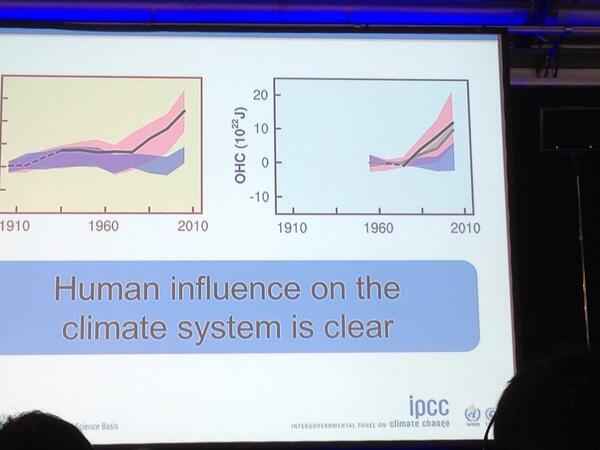 A slide from the IPCC press conference, tweeted by JPascal van Ypersele (@JPvanYpersele)
A slide from the IPCC press conference, tweeted by JPascal van Ypersele (@JPvanYpersele)Human influence has been detected in warming of the atmosphere and the ocean, in changes in the global water cycle, in reductions in snow and ice, in global mean sea level rise, and in changes in some climate extremes. This evidence for human influence has grown since AR4. It is extremely likely that human influence has been the dominant cause of the observed warming since the mid-20th century.
It is extremely likely that more than half of the observed increase in global average surface temperature from 1951 to 2010 was caused by the anthropogenic increase in greenhouse gas concentrations and other anthropogenic forcings together.
That's what the Intergovernmental Panel on Climate Change reports in its just-released Summary for Policymakers (PDF) of the newest assessment of the state of climate science. Compare that to the IPCC's 2007 headline assessment of the role of humans on climate change:
Most of the observed increase in global average temperatures since the mid-20th century is very likely due to the observed increase in anthropogenic greenhouse gas concentrations. This is an advance since the TAR’s conclusion that “most of the observed warming over the last 50 years is likely to have been due to the increase in greenhouse gas concentrations”. Discernible human influences now extend to other aspects of climate, including ocean warming, continental-average temperatures, temperature extremes and wind patterns.
Moving from "very likely" to "extremely likely" indicates a shift from over 90% confidence to over 95% certainty, reflecting 6 additional years of data, improvements in climate models, and a clearer sense of the human role in extreme weather events, which the 2007 report didn't list as a realm where human influence had been detected.
Perhaps the most stunning part of the report:
Greenhouse gases contributed a global mean surface warming likely to be in the range of 0.5°C to 1.3°C over the period 1951−2010, with the contributions from other anthropogenic forcings, including the cooling effect of aerosols, likely to be in the range of −0.6°C to 0.1°C. The contribution from natural forcings is likely to be in the range of −0.1°C to 0.1°C, and from internal variability is likely to be in the range of −0.1°C to 0.1°C. Together these assessed contributions are consistent with the observed warming of approximately 0.6°C to 0.7°C over this period.
Breaking that down, natural influences on climate change over the last 60 years have been essentially zero. The observed warming—warming the report describes as "unequivocal"—is all attributable to human activities.
But that's not all:
- "Over every continental region except Antarctica, anthropogenic forcings have likely made a substantial contribution to surface temperature increases since the mid-20th century"
- Changes in the upper atmoshere are "very likely" caused by humans
- "It is very likely that anthropogenic forcings have made a substantial contribution to increases in global upper ocean heat content (0–700 m)"
- "It is likely that anthropogenic influences have affected the global water cycle since 1960"
- "It is now very likely that human influence has contributed to observed global scale changes in the frequency and intensity of daily temperature extremes since the mid-20th century, and likely that human influence has more than doubled the probability of occurrence of heat waves in some locations"
- "Anthropogenic influences have very likely contributed to Arctic sea ice loss since 1979"
- "Anthropogenic influences likely contributed to the retreat of glaciers since the 1960s and to the increased surface mass loss of the Greenland ice sheet since 1993"
- "It is very likely that there is a substantial anthropogenic contribution to the global mean sea level rise since the 1970s"
Whodunnit? We did.

